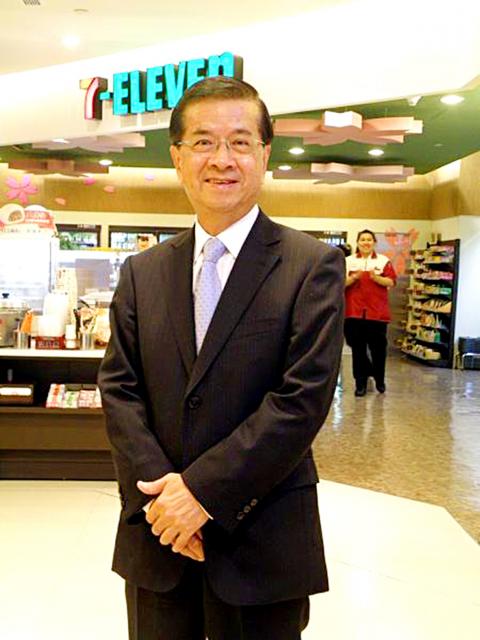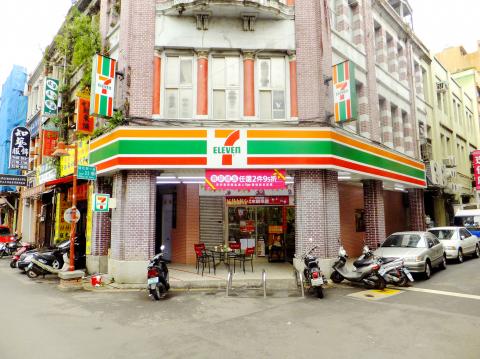Feb. 5 to Feb. 11
It’s hard to believe that today’s ubiquitous 7-Eleven was once labeled as the “prodigal son of Uni-President Enterprises Corp.” But during its early days, the convenience store cost the corporation more than NT$2 billion in total losses.
Launching its first store in February 1980 on Taipei’s Changan E Road, the venture had already eaten into about half the original capital of NT$1.9 billion by September 1982.

Photo: Yang Ya-min, Taipei Times
“Besides Uni-President, other shareholders had little desire to keep the stores running,” Lee Jen-fang (李仁芳) writes in the book, 7-Eleven Takes Over Taiwan (7-Eleven 統一超商縱橫台灣).
At the same time, foreign and local investors bombarded Uni-President with calls about acquiring the stores. But the corporation refused all offers, instead buying out the other shareholders and taking full control over the venture by incorporating it into the company as its “supermarket department.”
It would take several more years for the company to finally turn a profit, but this was the beginning of its 7-Eleven empire in Taiwan.

Photo courtesy of Wikimedia Commons
RISE OF THE MINIMART
The late 1970s saw the rise of the two food giants of Uni-President Enterprises Corp (UPE, 統一企業) and Wei Chuan Foods Corp (味全食品) in response to increased competition in the consumer market.and need for more streamlined and efficient operations.
However, the first mini-market chain was launched by the Council of Agriculture, Taipei City Government and Youth Development Administration in 1977. According to the a 60th Anniversary publication by Wei Chuan (who later purchased the chain), government officials launched this venture after visiting the US and noticing how clean their supermarkets were compared to the traditional markets of Taiwan.
In 1979, UPE simultaneously opened 14 “modern convenience stores” across the country. Run as a subsidiary, the company held half the shares and gave the rest to dealers, family and friends. The corporation not only wanted to create a clean and bright shopping experience, but also hoped to have complete control over the channels of distribution for its products by running its own stores.
It was a daring venture as the average annual income was less than US$2,500 back then, says Hsu Chung-jen (徐重仁), who played a key role in the rise of 7-Eleven.
“As a food producer, Uni-President jumped straight into the unfamiliar world of retail and chain stores, and opened 14 stores at once with the intent of opening more. They did not even understand the basic differences between an independent store and a retail chain,” he says.
Hsu says they started out working almost 20 hours a day. He and two colleagues borrowed two desks at the parent company to conduct business, but when the company needed the desks they were relegated to a couch by the receptionist.
Hsu adds that the stores struggled because they were not able to fully identify customer needs.
“To fulfill the one-stop-shop needs of our customers, if someone wanted a broom we would start selling brooms. By the end, we had seven or eight types of detergent and milk formula and even sold vegetables, fresh meat and fish,” Hsu says.
GROWING PAINS
Hsu tried to collaborate with US corporations, but talks were stalled due to the US cutting diplomatic ties in 1979. Finally, Southland Corporation, which ran 7-Eleven in the US, reached out and the two companies signed a deal to run the stores under the 7-Eleven module and moniker.
Southland’s directive was to establish uniform, modern stores that would eventually replace traditional “mom-and-pop” businesses. They targeted housewives primarily and the initial stores were all located in residential areas. As its name suggests, the initial stores opened at 7am and closed at 11pm. And like its US counterparts, it sold Slurpees and other signature items.
However, Hsu noticed that due to the different nature of residential areas in the US and Taiwan, the US-mandated module was not attracting as many customers as they expected. Their prices were also higher — and Taiwanese housewives then were much more sensitive to prices than their US counterparts.
In 1981, the stores experimented with 24-hour service, but its products did not attract late night shoppers and soon reverted to its original hours. The franchising module did not work either as it was uncommon in Taiwan at that time.
Hsu wanted to localize the stores by eschewing the Western fast food for tea eggs and meat buns, but Southland objected on the grounds that it would ruin the image of the store. Hsu insisted, and tea eggs are a staple of all convenience stores today.
The store experienced massive losses, but still had the full support of management. Hsu returned to the fold after a short departure and got rid of 35 underperforming locations, mostly in residential communities. They analyzed the sales revenue from each store and were confident enough in 1983 to make one of the stores permanently 24-hours.
The evolution continued from there. As more women went to work, 7-Eleven in 1985 launched its signature series of microwavable meals. It opened stores in more visible areas and poured money into advertising, also adjusting its target market to the 18 to 35 crowd who were less sensitive to higher prices.
In 1986, six years after the initial venture, the chain made a profit for the first time. There was still a long road to climb, but 7-Eleven was the prodigal son no more.
“We can make up what we lost during those six years in a month or two now,” the late Uni-President founder Kao Ching-yuan (高清愿) said in 1995.
Today, there are 5,235 7-Elevens across the nation, and UPE just opened its first staffless store at their headquarters in Taipei on Monday.
Taiwan in Time, a column about Taiwan’s history that is published every Sunday, spotlights important or interesting events around the nation that have anniversaries this week.

April 14 to April 20 In March 1947, Sising Katadrepan urged the government to drop the “high mountain people” (高山族) designation for Indigenous Taiwanese and refer to them as “Taiwan people” (台灣族). He considered the term derogatory, arguing that it made them sound like animals. The Taiwan Provincial Government agreed to stop using the term, stating that Indigenous Taiwanese suffered all sorts of discrimination and oppression under the Japanese and were forced to live in the mountains as outsiders to society. Now, under the new regime, they would be seen as equals, thus they should be henceforth

Last week, the the National Immigration Agency (NIA) told the legislature that more than 10,000 naturalized Taiwanese citizens from the People’s Republic of China (PRC) risked having their citizenship revoked if they failed to provide proof that they had renounced their Chinese household registration within the next three months. Renunciation is required under the Act Governing Relations Between the People of the Taiwan Area and the Mainland Area (臺灣地區與大陸地區人民關係條例), as amended in 2004, though it was only a legal requirement after 2000. Prior to that, it had been only an administrative requirement since the Nationality Act (國籍法) was established in

With over 80 works on display, this is Louise Bourgeois’ first solo show in Taiwan. Visitors are invited to traverse her world of love and hate, vengeance and acceptance, trauma and reconciliation. Dominating the entrance, the nine-foot-tall Crouching Spider (2003) greets visitors. The creature looms behind the glass facade, symbolic protector and gatekeeper to the intimate journey ahead. Bourgeois, best known for her giant spider sculptures, is one of the most influential artist of the twentieth century. Blending vulnerability and defiance through themes of sexuality, trauma and identity, her work reshaped the landscape of contemporary art with fearless honesty. “People are influenced by

The remains of this Japanese-era trail designed to protect the camphor industry make for a scenic day-hike, a fascinating overnight hike or a challenging multi-day adventure Maolin District (茂林) in Kaohsiung is well known for beautiful roadside scenery, waterfalls, the annual butterfly migration and indigenous culture. A lesser known but worthwhile destination here lies along the very top of the valley: the Liugui Security Path (六龜警備道). This relic of the Japanese era once isolated the Maolin valley from the outside world but now serves to draw tourists in. The path originally ran for about 50km, but not all of this trail is still easily walkable. The nicest section for a simple day hike is the heavily trafficked southern section above Maolin and Wanshan (萬山) villages. Remains of